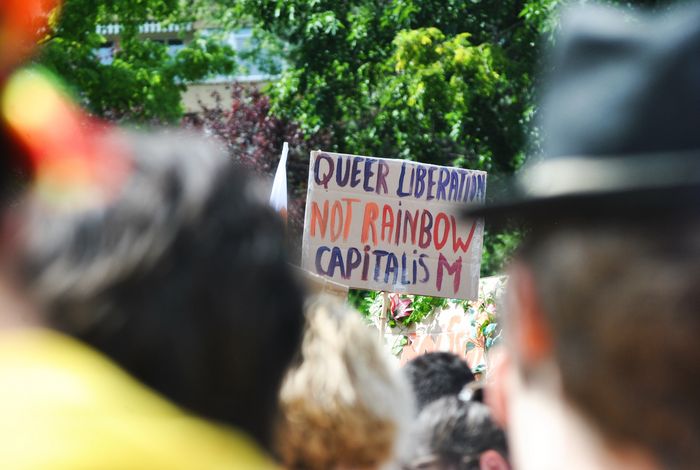Is LGBTQI* tourism contributing to foster acceptance and rights of homo- and transsexuals in travel destinations? Reflections from Cambodia, Colombia and Saudi Arabia.
Homosexuality is still prosecuted in 70 countries, being even punished by death in eleven. It is therefore not surprising that security still plays a major role for LGBTQI* (Lesbian, Gay, Bisexual, Transgender, Queer, Intersexual) travelers to this day. But travelling is not just a risk for LGBTQI* people. The industry also has the potential to strengthen the acceptance and rights for LGBTQI* locals within the travel destinations – in theory. Markus Ulrich from the Lesbian and Gay Federation in Germany (LSVD) is skeptical: "It is a mere claim that LGBTQI* traveling improves the legal and social situation in travel destinations and cannot be proven", he says. Rather, tourism often functions as a fig-leaf for states to demonstrate cosmopolitanism to the world, while its own LGBTQI* population continues to be massively repressed. The tourism industry is more optimistic: By entering repressive tourist destinations, the LGBTQI* industry can help to combat homophobia, according to the International Gay and Lesbian Travel Association (IGLTA), which, in this respect, agrees with other major travel associations. Dirk Baumgartl is also convinced that the visibility of LGBTQI* tourists have positive impacts on site. As the editor-in-chief of the travel magazine “Spartacus Traveler”, he knows the safest and the most risky holiday destinations for queer tourists. But the so-called Spartacus Gay Travel Index also clearly shows that laws and social norms vary greatly from country to country.
Cambodia - Benefitting from Travel Hotspot Thailand
Homosexuality is still illegal in Malaysia, Bhutan, the Maldives and Sri Lanka. Nevertheless, Southeast Asia is a number one LGBTQI* travel hotspot, first and foremost Thailand. The country is close to the legalization of same-sex marriage and thanks to campaigns against homophobia, Thailand is straight on its way to become the LGBTQI*-friendliest destination of Asia. Neighbouring states are benefitting from its popularity, says Dirk Baumgartl from Spartacus. "Many Asia fans start with a trip in Thailand and then explore the surrounding countries - such as Cambodia. Tourism can be a chance to get in touch with LGBTQI* people and strengthen the gay community in Cambodia." Nuon Sidara knows that many LGBTQI* locals are having high hopes for the industry. Sidara coordinates a Sexual Orientation and Gender Identity Project at the Cambodian Center for Human Rights in Phnom Penh and says: "Homosexuals and transsexuals from Cambodia see LGBTQI* tourism as their chance to find a job with a comparatively high income. With the right training and infrastructure for LGBTQI* tour operators, they could improve their financial position. This is often crucial to enhance the acceptance of their sexual orientation or gender identity in their personal environment."
Colombia – a new LGBTQI* paradise?
More and more countries are becoming safe for tourists of all stripes. They offer well-travelled LGBTQI* the opportunity to escape their "gay bubble" and to discover new treasures. One of these countries is Colombia. The booming tourist destination is not just as popular with German tourists as never before, the Spartacus Index ranks the destination on the same position as countries like Germany. Theresa Quiachon, consultant at Löning’s - Human Rights & Responsible Business sees tourism as a cornerstone to strengthen LGBTQI* rights. However, the tourism industry must actively support the contact between people with different backgrounds in order to promote mutual tolerance, she says. That's why Colombia has the best prerequisites to become an LGBTQI*-welcoming country, claims Dirk Baumgartl. "Colombia is a very open-minded country, also in terms of legislation. In recent years, the Colombian tourist agency “ProColombia” has spent a lot of work in studies and awareness raising for the local tourism industry, increasing tolerance for LGBTQI* in the Colombian travel industry and beyond."
Saudi Arabia – bottom line despite tourism ambitions
Saudi Arabia has an ambitious goal: to become less dependent on oil, the country wants to open its borders to international tourists and welcome 100 million guests over the next ten years. In tourism campaigns, the ultra-conservative kingdom presents itself open and diverse. But how does that fit to a country where homosexuality is still punished by death? But even in countries like Saudi Arabia tourism can foster social change for LGBTQI* people, says Theresa Quiachon. "Tourism companies can fight discrimination, for example by providing equal opportunities for recruitment and expecting their staff to show a non-discriminatory attitude towards all guests, including LGBTQI* travelers. But I personally would not recommend anyone to travel to a region where the own life is threatened." Dirk Baumgartl agrees and wouldn’t suggest LGBTQI* tourists to travel to Saudi Arabia. "However, always keep in mind that boycotts can cause enormous damage. Especially local communities are counting on other LGBTQI*s to visit their country and increase their visibility." Nevertheless, tourists run the risk of legitimizing LGBTQI*-hostile regimes with their travel, according to Markus Ulrich of LSVD: "For Saudi Arabia, one of the worst persecution states, a travel boycott should be self-evident - not just by LGBTQI* travelers. Unlike in poor countries, this does not affect the population but rather causes harm to a prestigious object of the regime."
The three different travel destinations Colombia, Cambodia and Saudi Arabia show that there is no simple answer to whether LGBTQI* tourism can improve the situation for homosexuals, transsexuals and intersexual people in the travel countries. Travelers will still have to make individual decisions on whether they travel to LQBTQI* hostile regimes on purpose to show solidarity with the locals, or avoid them as a form of protest and for their own safety.
Lea Thin is a Berlin-based geographer and journalist. In her work she focuses on issues around sustainability, gender, climate and development policy.


